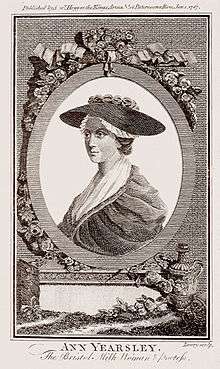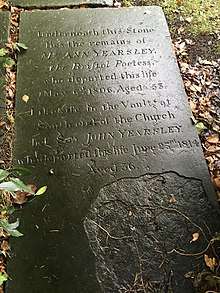Ann Yearsley
| Ann Yearsley | |
|---|---|
 Ann Yearsley, 1787 | |
| Born |
8 July 1753 Bristol, England |
| Died |
6 May 1806 (aged 52) Melksham, England |
| Resting place |
Clifton, Bristol Coordinates: 51°27′15″N 2°36′52″W / 51.45408°N 2.61448°W |
| Residence | Clifton, Bristol |
| Nationality | English |
| Occupation |
Milkmaid Poet |
| Years active | 1784–1796 |
| Known for | Poetry |
| Home town | Bristol |
Ann Yearsley, née Cromartie (1753–1806), was an English poet and writer.
Born in Bristol to John and Anne Cromartie (described as a milkwoman), Ann married John Yearsley, a yeoman, in 1774. A decade later the family were rescued from destitution by the charity of Hannah More and others. More organized subscriptions for Yearsley to publish Poems, on Several Occasions (1785). The success of the volume led to a quarrel between More and Yearsley over access to the trust in which profits from the undertaking were held. Yearsley included her account of this quarrel in an 'Autobiographical narrative' appended to a fourth, 1786, edition of the poems.
Now supported by Frederick Hervey, 4th Earl of Bristol, Yearsley published Poems, on Various Subjects in 1787. A Poem on the Inhumanity of the Slave-Trade appeared in 1788. Her poem was considered by many critics to rival a similar poem written by her ex-patron Hannah More entitled, "Slavery: A Poem".[1]
She turned to drama with Earl Goodwin: an Historical Play (performed in 1789 ; printed in 1791) and to novel-writing with The Royal Captives: a Fragment of Secret History, Copied from an Old Manuscript (1795). Her final collection of poetry, The Rural Lyre, appeared in 1796. She was one of many prominent Bristol women who campaigned against the Bristol slave trade.[2]

Yearsley's husband died in 1803; she died in 1806 at Melksham near Trowbridge, Wiltshire. Her grave may be found in Birdcage Walk, Bristol.
Robert Southey's Biography for Ann Yearsley
Robert Southey wrote a biography of Ann Yearsley in the year 1831. He called his biography an "introductory essay on the lives and works of our uneducated poets". The biography describes the first encounter that Hannah More, the patron of Ann Yearsley, had and her general impressions of her capacity as a writer and poet. Hannah More described her first encounter with Ann Yearsley as positive. She stated that her writing "excited [her] attention" because it "breathed the genuine spirit of poetry, and [was] rendered still more interesting by a certain natural and strong expression of misery that seemed to fill the head and mind of the author". Hannah More went on to describe Ann Yearsley as a woman that was highly uneducated and that had been taught to write by her brother. Yearsley was living in destitution with six young infants born in the space of seven years, while caring for aged mother, when a man named Mr. Vaughn (a man frequently mentioned in Yearsley’s poetry) introduced her to Hannah More. Furthermore, Hannah More was impressed by Yearsley’s ability to interpret the leading literature of the age with such accuracy by stating that "without having ever conversed with any body above her own level, she seems to mess the general principles of sound taste and just thinking."
Yearsley based her style, grammar, and spelling based on the limited amounts of literature that she had read which included some Shakespearean plays, Paradise Lost, and Night-Thoughts among others. More describes Yearsley as not even having seen a dictionary or knowing anything of grammatical rules, and being bound to “ignorant and vulgar” syntax, yet using language full of metaphor, imagery, and personification. More described herself as striving to save Yearsley from the vanity of fame and was more concerned about providing food for her than providing fame. Eventually, a strong disagreement over money left the two estranged. According to Rose, More was repeatedly startled when the milk-maid drew on classical sources for the work.[3] Plebeian poets were confined to the ghetto of folk poetry, during this time of great class prejudice.[4]
Southey described Yearsley a writer "gifted with voice" but "that had no strain of her own whereby to be remembered". He further reported that for a time before her death she was reported to be deranged, though there is no evidence to confirm this.[5]
Works
- Poems, on Several Occasions (1st edition, with preface by Hannah More, 1785) (Etexts)
- Poems, on Several Occasions (4th edition, with new preface by Yearsley, 1786)
- Poems, on Various Subjects (1787)
- A Poem on the Inhumanity of the Slave Trade (1788) (Etext)
- Stanzas of Woe (1790)
- Earl Godwin: An Historical Play (performed 1789; printed 1791)
- The Royal Captives: a Fragment of Secret History, Copied from an Old Manuscript (4 vols., 1795)
- The Rural Lyre: a Volume of Poems (1796)
Notes
- ↑ "Ann Yearsley (1752–1806)".
- ↑ "PortCities Bristol". www.discoveringbristol.org.uk. Retrieved 2009-04-15.
- ↑ Rose, Jonathan (2001). The Intellectual Life of the British Working Classes. London: Yale University Press. p. 19. ISBN 0-300-08886-8.
- ↑ Waldron, Mary (1996). Lactilla, Milkwoman of Clifton: The Life and Writings of Ann Yearsley. London: University of Georgia Press. pp. 37–46.
- ↑ "Ann Yearsley". Virginia Tech.
Further reading
- Kerri Andrews, (2013). Ann Yearsley and Hannah More, patronage and poetry : the story of a literary relationship. London: Pickering & Chatto. ISBN 9781848931527. OCLC 859159190.
- Mary Waldron (1996) Lactilla, milkwoman of Clifton: the life and writings of Ann Yearsley, 1753–1806
- Ann Yearsley, (2014) The Collected Works of Ann Yearsley. ed. by Kerri Andrews. London: Pickering and Chatto. ISBN 9781851966387. OCLC 863174134
External links
- Ann Yearsley at the Eighteenth-Century Poetry Archive (ECPA)
- Mary Waldron, ‘Yearsley , Ann (bap. 1753, d. 1806)’, Oxford Dictionary of National Biography, Oxford University Press, 2004, accessed 12 Nov 2006. The first edition of this text is available at Wikisource:

- Brycchan Carey, British Abolitionists - Ann Yearsley: biography and bibliography
- Works by or about Ann Yearsley in libraries (WorldCat catalog)